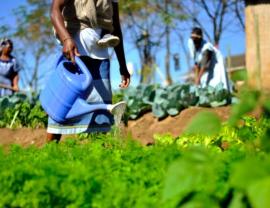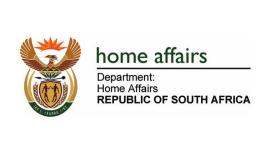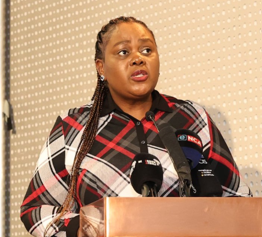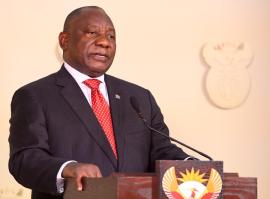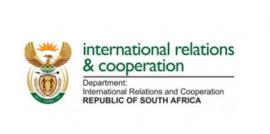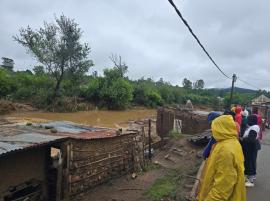Many will remember the childhood threat to finish our vegetables at dinnertime, or risk not growing up to be as strong as our favourite superheroes in comic books or TV shows.
And while we wished that those superheroes would swoop in to rescue us from the dreaded broccoli or whatever was on the plate, never would we have imagined that research being carried out today is looking into preserving what is on our plate from possible threat.
As adults, we’ve come to realise that heroes do exist in real life, albeit not cloaked in spandex and capes. The hero in this case is the National Planning Commission (NPC) which is working on research in the agricultural space at a time when climate change is having its way with the world.
“What would it look like if for example if certain crops are no longer available? What will it look like if we no longer have access to wheat at the price that we are used to? What does it mean for the cost of pap and what does that mean for our cultural legacy and the way that food plays a really important part in our social traditional, communal ways of being, ways of celebrating and ways of sustaining ourselves?”
Commissioner at the NPC, Dr Lebogang Pheko recently told SAnews, in an interview.
While her comment is indeed a scary thought, it points to the important role of research in any society.
Appointed by the President of the Republic of South Africa, the Commission is an independent advisory body and think tank that is the custodian of South Africa’s National Development Plan (NDP).
The plan seeks to eliminate poverty and reduce inequality by 2030 with raising economic growth, promoting exports and getting the economy to be more labour absorbing being a part of the plan’s objectives.
As one of the 26 Commissioners of the NPC, Pheko is putting her hand to the plough.
“We have been able to procure and to commission pieces of important research [which] speak to issues…including different agricultural methods, small business development, red tape reduction, irrigation and agriculture in this country,” she said.
Chapter 6 of the NDP states that agriculture, “as the primary economic activity in rural areas, has the potential to create close to one million new jobs by 2030. It adds that the vegetable industry could be one of the largest contributors to job creation and the improvement of livelihoods if the potential growth in demand in South Africa and the southern African region is considered”.
Research into irrigation and agriculture is among the body of research that Dr Pheko is working on.
“What we were looking at there was a few things: we were bearing in mind that firstly we are in the midst of climate change and climate vagaries. This means that with the water scarcity that we experience as a country is potentially going to get worse unless we begin to put in place mechanisms to reduce and manage that.”
The implications of that, she told SAnews are that harvesting seasons may change and that the kinds of foods that have been readily available may also change.
“This also has implications and bearing not only for the cost of food which is extremely significant, and the way that we have to import and export food in the future but also for the kinds of legacy foods that we associate with our day-to-day life,” she explained.
Pheko, who is also a senior researcher and political economist, said the research also looks at how the country should reframe its agricultural footprint going forward.
“It was also looking at the fact that many young people don’t have as much interest in land as we would like them to and in agricultural pursuit. We must think and rethink how we not so much rebrand …but really rethink the ways in which we are able going forward, to ensure that irrigation and agricultural studies are part of a discourse of nation building,” she explained.
In a newsletter to the nation in March, President Cyril Ramaphosa said that agriculture is one of South Africa’s most important sectors in the economy, adding that data from the Agricultural Business Chamber of South Africa (Agbiz) showed that the country’s agricultural exports reached a record $13.7 billion in 2024. Forty four percent of the products were exported to other African countries.
Additionally, the value and volume of the farming sector has more than doubled since the dawn of democracy in 1994 and is a major source of employment with 924,000 people having worked directly in agriculture and over 200,000 having worked elsewhere in the agriculture value chain by the end of 2024.
“The health and growth of our farming sector is vital to supporting small towns and keeping rural South Africa vibrant,” said the President.
To expand agriculture and create one million jobs in the sector, the Commission in the NDP makes several recommendations including increasing investment in water resource and irrigation infrastructure. Another of its recommendations is “to increase and refocus investment in research and development for the agricultural sector”.
Pheko said another element of the research was looking at what climate change looks like in the context of climate mitigating factors the country has to take into consideration.
“We’ve already seen this in KwaZulu-Natal where it’s becoming an annual occurrence that there are terrible floods, and yet it seems like we’re not able to mitigate this. What this means is also that, amid the floods, there will be disruption of everyday life.
“It also links to urban and rural planning and the intersection between urban and rural planning because I sometimes think that there’s a bit of a false divide between the two. We must plan for cities in the context of urban areas. We have to plan urban areas in the context of rural areas because we cannot continue to have the kind of overflow of people into urban areas because they don’t see a life for themselves in rural areas.
“So, sustainability in terms of water, in terms of agriculture, means that we have to rethink our rural development plans in the context of urban planning and in the context of self-sufficient autonomous nodes of possibility where people of all generations feel as though they can make a life for themselves,” she explained.
Beyond 2030 and why it matters
And just as superheroes anticipate trouble around those they protect, the research looks at various scenarios ensuring that the country does not find itself in a lamb to the slaughter situation.
“The research looks beyond 2030, its really long-term intergenerational planning. We are trying to project what are the sorts of scenarios that would be important for us to put in place so that we are able to begin to think and reimagine some of our socio spatial, socio agricultural and socio water and energy needs going forward.”
Asked about how she would describe the current South African landscape ahead of the 2030 NDP deadline, Commissioner Pheko said that the country’s economy continues to be complex in nature.
“Our economy is really complex – complex historically because of the kind of political economy of extraction that we come from, and we haven’t been really able to shift and remodel,” she explained.
She further added that the country’s economy tended to be labour intensive.
“For an economy that is trying to be STEM [ Science, Technology, Engineering, and Mathematics] oriented in generations to come, our basic fundamental education is not feeding into that sufficiently. You still have a large percentage of young people who by Grade 5, 6 cannot read for comprehension. You also have a large amount of young people who cannot grasp the fundamentals of mathematics in a way that is necessary for us to build a STEM culture.”
She added that to create a STEM culture requires intentionality and that the country’s planning and knowledge economy is not matching up with what “we hope will be our labour economy and a diversification of skills.”
“Another part is that our skills in the agricultural market, which is a very important market, are also being overtaken by mechanisation. We have to rethink our export and import markets,” she said.
G20
With the G20 Leaders’ Summit to be held from 22-23 November 2025, the NPC has been privy to some of the conversations ahead of the Summit.
“The NPC – because of our socio policies positioning – has been privy to quite a few of those conversations and processes,” she said, adding that the grouping provides an opportunity to advocate for issues that are impacting not only African nations but also the broader, global community.
“We are also trying to leverage our Presidency to amplify voices of dispossessed populations across the continent including advocating for the inclusion of more African nations in the G20 discussions.
“And remember, this follows the membership of the African Union [AU] as a bloc in 2023 and whether or not that membership of the AU is yielding dividends is something perhaps, we should advocate for and be much more vigorous about.
“It also coincides with a time of a lot of grappling with multiple crises including climate change, food security and economic instability among others. We can also think around how South Africa can confront these issues by trying to encourage more collaborative international efforts that recognise the interconnectedness of our challenges as a globe.”
She added that the G20 has substantive economic clout as it represents 85% of global Gross Domestic Product (GDP) and 75% of international trade.
“Again, I’m no champion of GDP as the primary instrument of growth, I think it is neocolonial and hasn’t really proven itself to be the most effective way to reframe development. But that said, certainly in terms of what those figures represent and the engagement in this influential forum to leverage this, perhaps those would be some of the few talking points.
Legacy
With the term of office of the Commissioners due come to an end in 2026, Pheko said that what keeps her up at night is the “possibility that we won’t be able to, after all of these efforts to look our descendants in the eye.”
“The possibility that we don’t deal with growing inequality…the missing middle and that the disposed remain dispossessed and lose hope in any possibility of a way forward, that for me is the worst-case scenario.”
Pausing to reflect on what she would like her legacy to be she said: “I think a commitment to building a solid foundation for policy formulation to enable our future governments and future Commissions to respond to the needs of citizens where we left off. I think another legacy would hopefully be a commitment that people would see that we tried to draft a long-term plan that charted a course for the country with multiple forms of growth.
“I also hope that we leave behind a legacy of collaboration, of strategic foresight to hopefully shape the future in a small way,” she said.
With the five-year, part time term of office of the third cohort of the NPC Commissioners approaching, Pheko said the work that the Commissioners are carrying out is not about reinventing the wheel.
“What we are trying to do is to build legacy work and legacy projects,” she said.
Just as superheroes prioritise the wellness of those they protect, the Commission is doing its bit by way of research to ensure a better South Africa, with our greens intact.-SAnews.gov.za

